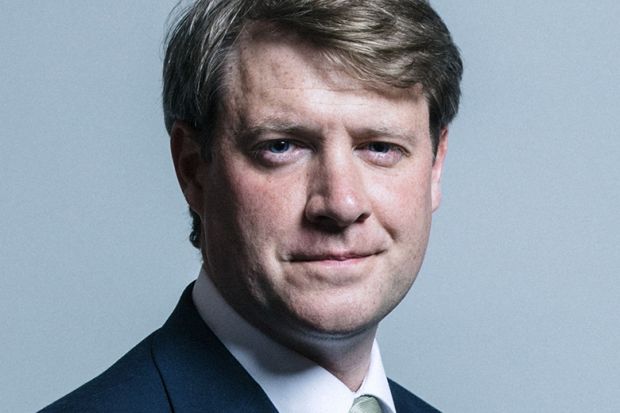England’s new universities minister has said that he does not support the introduction of minimum grade thresholds for entering higher education and has called for any major funding changes coming out of the government’s post-18 review to be subject to consultation, and to be introduced gradually.
Speaking to Times Higher Education in his first major policy interview since being appointed in December, Chris Skidmore also contradicted his predecessor Sam Gyimah’s aggressive stance on campus free speech: “I don’t believe that there is a creeping culture of censorship in our universities,” he said.
In the interview, the minister – a former part-time history lecturer at the University of Bristol who has written several books on the Tudors – said he was “keen” that the government’s response to the review of post-18 education being led by Philip Augar should “allow for the possibility of consultation”.
Leaks have suggested that the review panel may recommend a cut in the tuition fee cap from £9,250 to between £6,500 and £7,500 – with the extent of any replacement grant funding unclear – and has considered barring applicants with lower grades from accessing student loans, in effect preventing them from going to university.
Mr Skidmore said that his approach would be to “work with the HE sector about there not being any cliff edges, or that…whatever change looks like, that I’m able to reassure the sector that that change would be graduated”.
He continued: “My own view is that I would like to see – whether it’s a Green Paper approach, whether it’s a White Paper approach – an approach that would allow for those recommendations to be tested with the wider sector.”
Mr Skidmore said he wanted to ensure that universities do not see the review as “a stick to beat them with”, stressing that it was an opportunity to set out a vision for post-school education through to 2030, involving moving away “from this idea of the two separate routes of HE and FE”.
“The important message I want to give to the sector is that I’m a universities minister who believes that there aren’t too many people at university,” he added.
But, he continued, whether that was “something that happens immediately at 18 and finishes at 21” was a key issue to consider. “What we’ve got to do is create the learning pathways for people to step on [and] step off,” he said.
Speaking generally, he said: “I am proud to be a member of the Conservative Party that…removed the cap on student numbers and…argued that…we shouldn’t be turning round to people and saying to people ‘you are not able to go to university’.”
On the idea of the minimum grade threshold, Mr Skidmore said that he shared the concerns of vice-chancellors, who have highlighted that applicants with lower grades were much more likely to come from poorer backgrounds.
“I don’t believe that we should be having [a threshold], because ultimately it’s about protecting the most disadvantaged students who may not have had the opportunity to reach those [higher grade] qualifications,” Mr Skidmore said.
On free speech, Mr Skidmore said it was “really important we protect diversity of thought and of opinion”.
“But I don’t believe that there is a creeping culture of censorship in our universities,” he added. “And I don’t want to take individual examples and…transpose those across to suggest somehow there’s a culture war taking place in our campuses in the UK, because I simply haven’t seen the data that presents itself to me on that scale.
“The tone, for me as a universities minister, is incredibly important on this issue.”
Mr Gyimah had said he was worried by a “creeping culture of censorship” in universities. But, speaking as the government released new guidance on campus free speech, Mr Skidmore said: “I don’t want accusations to be thrown without any meaningful evidence behind [them], and I also want to make sure that this is seen – quite squarely – within a legal context. The government has a duty to provide that, but also not to be making value judgements on this thing.”
Graduate earnings figures by course and institution have become key battlegrounds within government as the post-18 review continues, with Mr Gyimah attacking the benefits of some degrees as “threadbare”.
Striking a different tone, Mr Skidmore said that “the historian in me...wants a proper evaluation and analysis of the facts”. He acknowledged the key influence of regional economies on earnings, noting that “if you are a student, say, who studied at the University of Leeds and decided to stay in Leeds or maybe moved to Sheffield, your [value for money] results are going to be very different than if you moved down to London”.
Mr Skidmore said that a data advisory group would inform him about the context of data on a range of issues. “I’m very keen to make sure that I’m not the minister who shoots from the hip,” he said.
On the question of whether the UK will become an associate member of the European Union’s next research programme after Brexit, Mr Skidmore emphasised that talks cannot begin until the EU has finalised the programme’s regulations. European elections and the choice of a new commission will further delay talks.
The minister said: “Our ambition is to associate…I hope that going forwards we’ll have the opportunity [to enter talks] at the end of 2019 and into 2020. The programme begins in [20]21…it’s tight but possible.”
Register to continue
Why register?
- Registration is free and only takes a moment
- Once registered, you can read 3 articles a month
- Sign up for our newsletter
Subscribe
Or subscribe for unlimited access to:
- Unlimited access to news, views, insights & reviews
- Digital editions
- Digital access to THE’s university and college rankings analysis
Already registered or a current subscriber? Login








